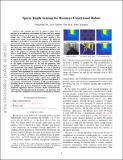Sparse depth sensing for resource-constrained robots
Author(s)
Ma, Fangchang; Carlone, Luca; Ayaz, Ulas; Karaman, Sertac
DownloadSubmitted version (7.966Mb)
Terms of use
Metadata
Show full item recordAbstract
We consider the case in which a robot has to navigate in an unknown environment, but does not have enough on-board power or payload to carry a traditional depth sensor (e.g., a 3D lidar) and thus can only acquire a few (point-wise) depth measurements. We address the following question: is it possible to reconstruct the geometry of an unknown environment using sparse and incomplete depth measurements? Reconstruction from incomplete data is not possible in general, but when the robot operates in man-made environments, the depth exhibits some regularity (e.g., many planar surfaces with only a few edges); we leverage this regularity to infer depth from a small number of measurements. Our first contribution is a formulation of the depth reconstruction problem that bridges robot perception with the compressive sensing literature in signal processing. The second contribution includes a set of formal results that ascertain the exactness and stability of the depth reconstruction in 2D and 3D problems, and completely characterize the geometry of the profiles that we can reconstruct. Our third contribution is a set of practical algorithms for depth reconstruction: our formulation directly translates into algorithms for depth estimation based on convex programming. In real-world problems, these convex programs are very large and general-purpose solvers are relatively slow. For this reason, we discuss ad-hoc solvers that enable fast depth reconstruction in real problems. The last contribution is an extensive experimental evaluation in 2D and 3D problems, including Monte Carlo runs on simulated instances and testing on multiple real datasets. Empirical results confirm that the proposed approach ensures accurate depth reconstruction, outperforms interpolation-based strategies, and performs well even when the assumption of a structured environment is violated. Keywords: Depth reconstruction; mapping; compressive sensing; ℓ1 minimization; resource-constraints.
Date issued
2019-06Department
Massachusetts Institute of Technology. Laboratory for Information and Decision Systems; Massachusetts Institute of Technology. Department of Aeronautics and AstronauticsJournal
International Journal of Robotics Research
Publisher
SAGE Publications
Citation
Ma, Fangchang et al. "Sparse depth sensing for resource-constrained robots." International Journal of Robotics Research 38, 8 (July 2019): 935-980. ©2019 The Author(s) .
Version: Original manuscript
ISSN
0278-3649
1741-3176